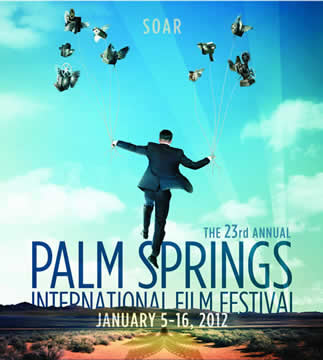 Burbank, CA – January 10, 2012: Today, Cinema Without Borders has announced the five nominees for its Bridging The Borders Award at 2012 Palm Springs International Film Festival. The Bridging The Borders Award at the 2012 Palm Springs International Film Festival will be given to the most successful film in bringing the people of our world closer together.
Burbank, CA – January 10, 2012: Today, Cinema Without Borders has announced the five nominees for its Bridging The Borders Award at 2012 Palm Springs International Film Festival. The Bridging The Borders Award at the 2012 Palm Springs International Film Festival will be given to the most successful film in bringing the people of our world closer together.
The five nominees for the Cinema Without Borders Bridging The Borders Award are: Almania (Germany), Le Havre (Finland), Monsieur Lazhar (Canada), Morgan (Romania ), and Terraferma (Italy). The Bridging The Borders Award winning film will be announced on Sunday, January 15th, at the Palm Springs International Film Festival award ceremony.
2012 Cinema Without Borders’ Bridging the Borders Award, Prize provided and Award sponsored by HP Workstations. Director of the winning film will receive an HP 8560w Elitebook Mobile Workstation with a built-in HP DreamColor display, an approximately $4000 value.
Nominees: Almanya, Welcome to Germany
Almanya, Welcome to Germany
Almanya – Willkommen in Deutschland
Germany, 2011, 97 Minute Running Time
A charming, colorfully styled comedy, Almanya centers on multiple generations of a German-Turkish clan and derives its touching, laugh-out-loud humor from cultural misunderstandings and the question of what constitutes national identity. Scripted by first-time director Yasemin Samdereli and her sister Nesrin, the narrative is neatly structured into two interwoven time frames. The first, set in the present, introduces the Yilmazes in their German home, as patriarch Huseyin insists that his family accompany him for a holiday in Turkey. The second strand follows the young Huseyin in distant Anatolia, his arrival in 1964 Germany as the 1,000,001st Gastarbeiter and his family’s gradual acclimatization – if not necessarily assimilation. On a more serious note, one of the film’s exceptional aspects is the way it encompasses the history of guest workers in Germany, particularly via the incorporation of well-chosen B&W archive footage under the beginning and end credits. Winner: Audience Award, Chicago Film Festival; Best Film, Best Screenplay, German Film Awards
Director: Yasemin Samdereli
Producer: Andreas, Richter, Ursula Woerner, Annie Brunner
Editor: Andrea Mertens
Screenwriter: Yasemin Samdereli, Nesrin Samdereli
Cinematographer: The Chau Ngo
Music: Gerd Baumann
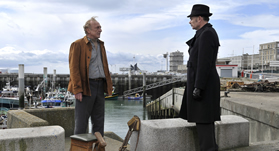 Le Havre
Le Havre
Finland, 2011, 93 Minute Running Time
The first in a trilogy of stories set in European ports, Aki Kaurismaki’s minimalist gem strikes the perfect balance between deadpan and charm in a political fairytale tale of underdog solidarity. Once a struggling author, Marcel Max has relocated to the coast where he now spends his time shining shoes, dining with his beloved wife Arletty and sharing a drink with pals at his neighborhood bar. The arrival of Idrissa, an African refugee boy, coincides with Arletty suddenly going into hospital, upsetting Marcel’s simple yet content existence. A police dragnet sets out to deport the boy, but they’ve met their match in Marcel, who is emboldened by a quiet but unshakeable sense of humanity and the support of his quartier. With pitch perfect performances, this Cannes FIPRESCI award-winner is a timeless comic masterpiece. “A stylized and sentimental fairy tale about the way the world might be … Aki Kaurismäki has become a major inheritor of the comic-humanist tradition of Charlie Chaplin, Jean Renoir and Jacques Tati.” – AO Scott, The New York Times
Director: Aki Kaurismäki
Producer: Aki Kaurismäki
Editor: Timo Linnasalo
Screenwriter: Aki Kaurismäki
Cinematographer: Timo Salminen
Principal Cast: André Wilms, Kati Outinen, Jean-Pierre Darroussin, Blondin Miguel, Elina Salo, Jean Piere Leaud
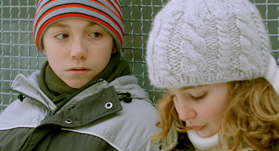 Monsieur Lazhar
Monsieur Lazhar
Canada, 2011, 94 Minute Running Time
Bachir Lazhar is a middle-aged Algerian immigrant seeking political refuge in Quebec. Bachir jumps at the opportunity to replace a Montreal elementary school teacher who committed suicide one night after class. The school’s overworked principal is initially relieved. The story focuses on Bachir’s relationship with two of his pupils: a ten-year-old boy traumatized by discovering the body of his teacher, and a girl whose interpretation of the event and resentment toward her friend provoke unforeseen revelations. To these children in shock, Bachir’s traditional teaching methods may well provide the structure they need–even if, to Bachir’s dismay, the work of Balzac remains beyond their reach. A luminous and tender tale about the lessons we learn from one another, regardless of age, this complex character study speaks of loss, innocence and imposture in an eloquent yet simple manner. This remarkable picture is carried by the single-named Algerian actor Fellag, who makes this strange man entirely believable but who never overplays the part or turns him into a conventional Hollywood hero. Winner: Audience award, Locarno Film Festival; Best Screenplay, FIPRESCI prize, Valladoid Film Festival
Director: Philippe Falardeau
Producer: Luc Dery, Kim McCraw
Editor: Stéphane Lafleur
Screenwriter: Philippe Falardeau
Cinematographer: Ronald Plante
Music: Martin Leon
Principal Cast: Fellag, Sophie Nelisse, Émilien Neron, Danielle Proulx, Brigitte Poupart
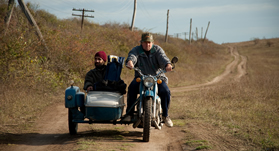 Morgen
Morgen
Romania, 2010, 100 Minute Running Time
Mild-mannered Nelu works as a security guard in the local supermarket in Salonta, a small town on the Romanian-Hungarian border. This is a place where many illegal emigrants try to cross, by any means possible, to Hungary and then further into Western Europe. For Nelu, each day is mostly the same. Fishing at dawn, then work, and finally home with his wife, Florica. They live alone at an isolated farmhouse outside town. One morning, Nelu “fishes” something totally different out of the river: a Turkish man trying to cross the border. Not able to communicate verbally, the two men still understand each other to a certain extent. Nelu takes the loquacious stranger to the farmhouse, gives him some dry clothes, food and shelter. “Morgen,” Nelu tells him, tomorrow things will work out. Crisan’s poignant comic drama highlights the wonderful, unexpected kindness of average people and the utter absurdity of borders. Winner: Best Director, Best Actor, FIPRESCI Prize, Thessaloniki Film Festival.
Director: Marian Crisan
Producer: Anca Puiu, Marianne Slot, Ivan Angelusz
Editor: Tudor Pojoni
Screenwriter: Marian Crisan
Cinematographer: Tudor Mircea
Music: Calin Potcoava
Principal Cast: Andrá Hatházi, Yilmaz Yalcin, Elvira Rimbu, Dorin C. Zachei, Molnar Levente, Razvan Vicoveanu
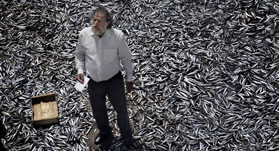 Terraferma
Terraferma
Italy, 2011, 88 Minute Running Time
A political powder keg sparks intense drama in Emanuele Crialese’s latest tale of working class Sicilians. On this occasion, Crialese’s protagonist is Ernesto (Mimmo Cuticchio), an old-fashioned fisherman on an island that’s quickly turning into a tourist trap. Happening upon an imperiled boatload of African refugees, he selflessly rescues a handful of passengers and hides them from the authorities. Meanwhile, Ernesto’s daughter-in-law (Donatella Finocchiaro) and grandson (Filippo Pucillo) agonize over the potential repercussions of harboring illegal immigrants until one of them is driven to commit a horrendous crime. Well-versed in the customs and concerns of Sicilians, Crialese has helmed a film that’s rich in authenticity and generous with its insights. Furthermore, the writer/director possesses a gift for seamlessly incorporating front-page issues into the fabric of an intimate family drama. In a narrative rife with struggles—whether it’s Ernesto’s efforts to preserve his failing livelihood or the immigrants’ hazardous pursuit of a better life—the most compelling conflict found here is undoubtedly the one between traditional values and an increasingly callous world.
Director: Emanuele Crialese
Producer: Riccardo Tozzi, Giovanni Stabilini, Marco Chimenz
Editor: Simona Paggi
Screenwriter: Emanuele Crialese, Vittorio Moroni
Cinematographer: Fabio Cianchetti
Music: Franco Piersanti
Principal Cast: Filippo Pucillo, Donatella Finocchiaro, Mimmo Cuticcho, Giuseppe Fiorello, Timnit T.

